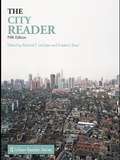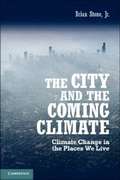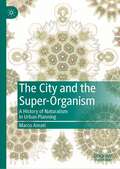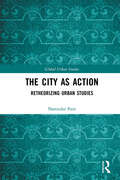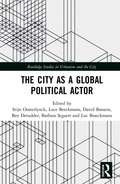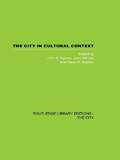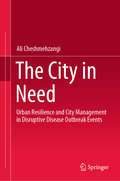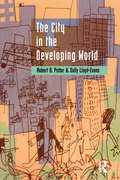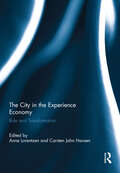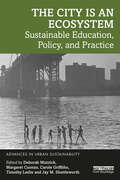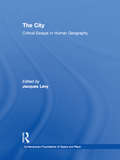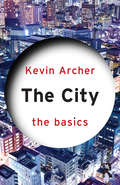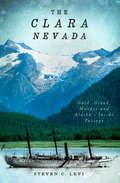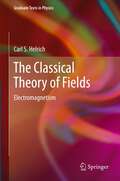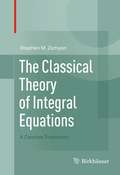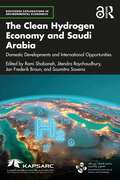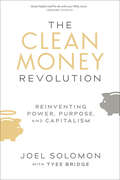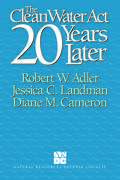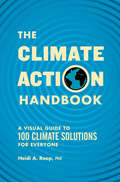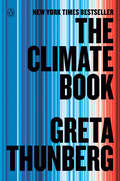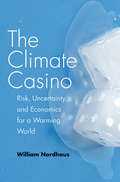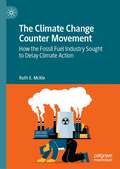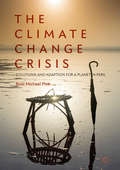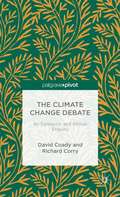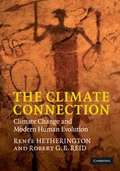- Table View
- List View
The City Reader Fifth Edition
by Frederic Stout Richard T. LegatesThe fifth edition of the highly successful City Reader juxtaposes the best classic and contemporary writings on the city. It contains fifty-seven selections including seventeen new contributions by experts including Elijah Anderson, Robert Bruegmann, Michael Dear, Jan Gehl, Harvey Molotch, Clarence Perry, Daphne Spain, Nigel Taylor, Samuel Bass Warner, and others - some of which have been newly written exclusively for The City Reader. Classic writings from Ebenezer Howard, Ernest W. Burgess, LeCorbusier, Lewis Mumford, Jane Jacobs and Louis Wirth, meet the best contemporary writings of Sir Peter Hall, Manuel Castells, David Harvey, Kenneth Jackson. This edition of The City Reader has been extensively updated and expanded to reflect the latest thinking in each of the disciplinary areas included and in topical areas such as sustainable urban development, climate change, globalization, and the impact of technology on cities. The plate sections have been extensively revised and expanded and a new plate section on global cities has been added. The anthology features general and section introductions and introductions to the selected articles. New to the fifth edition is a bibliography listing over 100 of the top books for those studying Cities.
The City and the Coming Climate: Climate Change and the Places We Live
by Brian Stone Jr.This book is the first to explore the dramatic amplification of global warming underway in cities and the range of actions that individuals and governments can undertake to slow the pace of warming. A core thesis of the book is that the principal strategy currently advocated to mitigate climate change - the reduction of greenhouse gases - will not prove sufficient to measurably slow the rapid pace of warming in urban environments. Brian Stone explains the science of climate change in terms accessible to the nonscientist and with compelling anecdotes drawn from history and current events. The book is an ideal introduction to climate change and cities for students, policy makers, and anyone who wishes to gain insight into an issue critical to the future of our cities and the people who live in them.
The City and the Super-Organism: A History of Naturalism in Urban Planning
by Marco AmatiThis book traces how naturalism—the idea of a common theory uniting natural social systems—has contributed to major shifts in urban planning. Beginning in the 17th century, when the human body began to emerge as an inspiration for urban planning, the book examines the work of medical analyses of city life. Responding to the 19th century industrial revolution and 20th century modernism, the Second World War and mass motorisation, Dr Marco Amati shows how vitalism, eugenics, evolutionary theories and medical treatments were applied to understand cities and propose new urban forms. While critically evaluating the uses of naturalism, Amati also observes a renewed interest in the application of sciences to analyse city life, arguing that this is essential to help resolve challenges of human-induced climate change.
The City as Action: Retheorizing Urban Studies (Global Urban Studies)
by Narendar PaniIn constructing the urban as a set of interconnected actions, this book presents a less travelled route to understanding the city. It leads to a fresh perspective on several issues central to urban theory, including the uniqueness of a city alongside practices it shares with other urban places. This book presents an innovative theoretical contribution to the field of urban studies, bridging the gap between western centric scholarship and perspectives from the global South. It offers conceptually rich insights, combining notions of cities as organisms, and references to postcolonial urban studies, with insights around aspirations, capabilities, agency, and social identity. It develops concepts, like the Proximity Principle, that help explain the experience of a city. This conceptualization of the city as a process should interest all who are sensitive to cities, whether they study them in academia or simply develop close associations with specific urban places.
The City as a Global Political Actor (Routledge Studies in Urbanism and the City)
by Ben Derudder Barbara Segaert Stijn Oosterlynck Luc Braeckmans Luce Beeckmans David BassensThis book engages with the thorny question of global urban political agency. It critically assesses the now popular statement that in the context of paralysed and failing nation state governments, cities can and will provide leadership in addressing global challenges. Cities can act politically on the global scale, but the analysis of global urban political agency needs to be firmly embedded in the field of urban studies. Collectively, the chapters in this volume contextualize urban agency in time and space and pluralize it by looking at how urban agency is nurtured through coalitions between a wide range of public and private actors. The authors develop and critically assess the conceptual underpinnings of the notion of global urban political agency from a variety of theoretical and disciplinary perspectives. The second part contains several (theoretically informed) empirical analyses of global urban political agency in cities around the globe. This book geographically expands analysis by looking beyond global cities in diverse contexts. It is highly recommended reading for scholars in the fields of international relations and urban studies who are looking for an interdisciplinary and empirically grounded understanding of global urban political agency, in a diversity of contexts and a plurality of forms.
The City in Cultural Context
by John Mercer John A. Agnew David E. SopherRoutledge Library Editions: The City reprints some of the most important works in urban studies published in the last century. For further information on this collection please email info.research@routledge.co.uk.
The City in Need: Urban Resilience and City Management in Disruptive Disease Outbreak Events
by Ali CheshmehzangiThis book fills a major gap in academic research, by exploring ‘urban resilience measures’ and ‘city management issues’ during disruptive disease outbreak events. Based on the overarching concept of ‘resilience thinking’, it addresses critical issues of preparedness, responsiveness and reflectiveness in the event of outbreak, focusing on cities and how they should prepare to combat a variety of adversities and uncertainties caused by outbreaks. This comprehensive book is an essential guide for decision-makers, city authorities, planners, healthcare and public health authorities, and those communities and businesses that face disease outbreak events. It also offers a set of practical measures to support the development of tailor-made strategies in the form of an action plan. These strategies should address outbreak control and containment measures, institutional rearrangements, management of urban systems, and healthiness of the society. Divided into six chapters, this book explores important topics of ‘urban resilience’ and ‘city management’ for preparedness action plans and responsiveness planning. Further, it presents a comprehensive urban resilience approach used to support city management in the recent outbreaks in Chinese cities, which can be applied in cities around the globe to strengthen their resilience and maximise the practicality of urban resilience and minimise urban vulnerabilities during disease outbreaks. Highlighting topics such as maintaining societal well-being, community engagement, and multi-sectoral city management enhancement, this book offers a unique combination of research, practices and lessons learned to aid cities in need.
The City in the Developing World
by Robert B. Potter Sally Lloyd-EvansThe City in the Developing World is a comprehensive and up-to-date introduction to urbanisation in developing countries. The goal of this text is to place an understanding of the developing world city in its wider global context. First, this is done by developing the concept of social surplus product as a key to understanding the character of the contemporary Third World city. Second, throughout this text, the city in developing areas is centrally placed in the context of global, social, economic, political and cultural change. Thus, the important themes of globalisation, modernity and postmodernity are examined both in relation to the structure of sets of towns and cities which make up the national or regional urban system, and in respect of ideas and concepts dealing with the morphology, structure and social patterning of individual urban areas.The City in the Developing World is a core text for second and third year undergraduates in the fields of geography, development studies, planning, economics and the social sciences, taking options which deal with development issues, development theory, gender and development and Third World development.
The City in the Experience Economy: Role and Transformation
by Anne Lorentzen Carsten Jahn HansenThe book develops a new approach to urban development in which leisure, pleasure or experiences are seen as key drivers. History, authenticity, urban qualities, local culture and leisure offerings or a vibrant retail sector are thus assets in local development also outside of the big cities. Globalization and high mobility are necessary aspects of the development, which entails the development of high urban profiles in a globalized and highly competitive world. Apart from experiential qualities a critical urban size, is also required. Experience qualities can be connected to urban design, where particular designs stimulate citizens’ learning and activity in the urban space. They can also be connected to more tourist related large scale projects of experiential mass consumption with fun parks and shopping. A combination of the two approaches has been developed to promote for example car brands and cities through experiential car museums. New stakeholders, new network based forms of cooperation and new entrepreneurial strategies are connected to urban development in ‘the experience economy'. In particular new network based approaches are needed if small and rural places should also reap the fruits of the experience economy.This book was originally published as a special issue of European Planning Studies.
The City is an Ecosystem: Sustainable Education, Policy, and Practice (Advances in Urban Sustainability)
by Margaret Cuonzo Deborah Mutnick Carole Griffiths Timothy Leslie Jay M. ShuttleworthThe City is an Ecosystem maps an interdisciplinary, community-engaged response to the great ecological crises of our time—climate change, biodiversity loss, and social inequality—which pose particular challenges for cities, where more than half the world’s population currently live. Across more than twenty chapters, the three parts of the book cover historical and scientific perspectives on the city as an ecosystem; human rights to the city in relation to urban sustainability; and the city as a sustainability classroom at all educational levels inside and outside formal classroom spaces. It argues that such efforts must be interdisciplinary and widespread to ensure an informed public and educated new generation are equipped to face an uncertain future, particularly relevant in the post-COVID-19 world. Gathering multiple interdisciplinary and community-engaged perspectives on these environmental crises, with contemporary and historical case study discussions, this timely volume cuts across the humanities and social and health sciences, and will be of interest to policymakers, urban ecologists, activists, built environment professionals, educators, and advanced students concerned with the future of our cities.
The City: Critical Essays in Human Geography (Contemporary Foundations of Space and Place)
by Jacques LévyThe spread of urbanization has transformed the concept of the city, but the way urban planners, urban scientists and, above all, urban dwellers address it has also changed, probably even more so. The city is thus a new topic for geography, a discipline that has experienced an ambiguous relationship to cities in the past. What kind of geography is required in order to bring fresh insight to this renewed field? Drawing together a wide range of texts from philosophers, sociologists and economist as well as geographers and urban planners, this volume provides a theoretical framework within which this question can begin to be explored.
The City: From The Center To The Margins (The Basics)
by Kevin ArcherThe City: The Basics provides a brief yet compelling overview of the study of cities and city life. The book draws on a range of perspectives – economic, political, cultural, and environmental aspects are all considered – to provide a broad comparison of the evolution of cities in the rich Global North and the poorer Global South. Topics covered in the book include: a brief history of cities from ancient times to the post-modern present the differences between "global cities" in the North and "megacities" in the South the environmental impact of urban life and the idea of sustainable cities urban planning, urban politics and urban poverty. Featuring suggestions for further reading, recommended websites and a number of maps and illustrations, this is the ideal starting point for those interested in any aspect of cities or urban studies.
The Clara Nevada: Gold, Greed, Murder and Alaska's Inside Passage
by Steven C. LeviThe true story of a mysterious shipwreck during the Klondike gold rush. In early February 1898, witnesses reported a giant orange fireball reflected in the glacial waters of Alaska&’s Lynn Canal. At the height of Klondike gold fever, the Clara Nevada disappeared into an epic storm, taking passengers and priceless cargo with her. Was the explosion an accident—or a robbery gone wrong? Did Captain C.H. Lewis make off with $165,000—$13.6 million in today&’s currency—in raw gold? Or was the sinking simply a case of a sea-weary steamer meeting an untimely end? Alaska historian Steven C. Levi combs the archives to piece together the true account of the Clara Nevada&’s final voyage, attempting to solve the riddle of the lost steamer that resurfaced ten years after that tragic night and became known as Alaska&’s ghost ship.
The Classical Theory of Fields
by Carl S. HelrichThe study of classical electromagnetic fields is an adventure. The theory is complete mathematically and we are able to present it as an example of classical Newtonian experimental and mathematical philosophy. There is a set of foundational experiments, on which most of the theory is constructed. And then there is the bold theoretical proposal of a field-field interaction from James Clerk Maxwell. This textbook presents the theory of classical fields as a mathematical structure based solidly on laboratory experiments. Here the student is introduced to the beauty of classical field theory as a gem of theoretical physics. To keep the discussion fluid, the history is placed in a beginning chapter and some of the mathematical proofs in the appendices. Chapters on Green's Functions and Laplace's Equation and a discussion of Faraday's Experiment further deepen the understanding. The chapter on Einstein's relativity is an integral necessity to the text. Finally, chapters on particle motion and waves in a dispersive medium complete the picture. High quality diagrams and detailed end-of-chapter questions enhance the learning experience.
The Classical Theory of Integral Equations
by Stephen M. ZemyanThe Classical Theory of Integral Equations is a thorough, concise, and rigorous treatment of the essential aspects of the theory of integral equations. The book provides the background and insight necessary to facilitate a complete understanding of the fundamental results in the field. With a firm foundation for the theory in their grasp, students will be well prepared and motivated for further study. Included in the presentation are: A section entitled Tools of the Trade at the beginning of each chapter, providing necessary background information for comprehension of the results presented in that chapter; Thorough discussions of the analytical methods used to solve many types of integral equations; An introduction to the numerical methods that are commonly used to produce approximate solutions to integral equations; Over 80 illustrative examples that are explained in meticulous detail; Nearly 300 exercises specifically constructed to enhance the understanding of both routine and challenging concepts; Guides to Computation to assist the student with particularly complicated algorithmic procedures. This unique textbook offers a comprehensive and balanced treatment of material needed for a general understanding of the theory of integral equations by using only the mathematical background that a typical undergraduate senior should have. The self-contained book will serve as a valuable resource for advanced undergraduate and beginning graduate-level students as well as for independent study. Scientists and engineers who are working in the field will also find this text to be user friendly and informative.
The Clean Hydrogen Economy and Saudi Arabia: Domestic Developments and International Opportunities (Routledge Explorations in Environmental Economics)
by Rami Shabaneh Jitendra Roychoudhury Jan Frederik Braun Saumitra SaxenaThis book provides a first-of-its-kind analysis of the emerging global hydrogen economy from the vantage point of one of the world’s biggest energy providers: Saudi Arabia. In 2021, and within the context of the Circular Carbon Economy framework, Saudi Arabia announced its goal to reach net-zero carbon emissions by 2060 and produce a substantial amount of clean hydrogen annually by 2030. The Kingdom is optimally situated geographically between the major demand markets in Europe and North Asia, from where it can leverage clean hydrogen exports as a potential tool to become a player of strategic importance and successfully diversify its economy under its Vision 2030 program. More broadly, the book charts a course for fossil fuel-exporting countries such as Saudi Arabia to carve a competitive position for themselves over the forthcoming decades using clean hydrogen as a catalyst for the energy transition.With contributions from global energy experts, the chapters in this book provide a multifaceted analysis of the "who," "what," "where," and "why" related to clean hydrogen development within and beyond Saudi Arabia. Collectively, the contributions analyze the countries and regions relevant to Saudi Arabia in terms of dedicated hydrogen policies, projects, and approaches that aim to incentivize production and demand in an increasingly carbon-constrained world. The book is a timely, unique and an indispensable resource for practitioners and students of energy, geopolitics, and climate policy working on hydrogen in academia, applied research, national government bodies, and international organizations.
The Clean Money Revolution: Reinventing Power, Purpose, and Capitalism
by Joel Solomon Tyee Bridge“[Joel is] a beloved local financial superhero, and this book is a brilliant roadmap to purposeful investing.” —Catherine Ludgate, Manager of Community Investment, VancityBy 2050, $50 trillion will change hands in North America in the largest generational wealth transfer ever. It will remake the world and be the biggest money-making opportunity in history.“Business as usual,” founded on exploitation and environmental ruin, is over. Climate catastrophe, reactionary politics, and widening inequity have put the world on edge. Meanwhile innovations are shifting the economic ground, and an entire generation is pounding the table for real change. Capitalism is evolving into a force that can restore the planet, transform the global economy, and bring justice to people.Joel Solomon, impact investor and change agent, lays it on the line. The Clean Money Revolution is part memoir of an inspiring thought leader’s journey from presidential campaigner to pioneering investor, part insider’s guide to the businesses remaking the world, and part manifesto for a new vision of profit, power, and purpose.Meet some of the people behind this massive shift, and discover the role you can play in the $50-trillion movement toward true prosperity. A must-read for investors, wealth advisors, aspiring entrepreneurs, and all who want their values and money to work together to transform the future.The Clean Money Revolution is on. Join it!“Good helpful stuff to do with your filthy lucre.” —Margaret Atwood, author of The Handmaid’s Tale“Joel Solomon so eloquently lights the path society needs to take in order to ensure future generations can flourish on a sustainable planet earth.” —Reverend Yearwood, President of the Hip Hop Caucus
The Clean Water Act 20 Years Later
by Robert W. Adler Diane M. Cameron Jessica C. LandmanThis volume explores the issues associated with the complex subject of water quality protection in an assessment of the successes and failures of the Clean Water Act over the past twenty years. In addition to examining traditional indicators of water quality, the authors consider how health concerns of the public have been addressed, and present a detailed examination of the ecological health of our waters. Taken together, these measures present a far more complete and balanced picture than raw water quality data alone.As well as reviewing past effectiveness, the book includes specific recommendations for the reauthorization of the Act, which is to be considered by Congress in 1995. This balanced and insightful account will surely shape the debate among legislative and policy experts and citizen activists at all levels who are concerned with issues of water quality.
The Climate Action Handbook: A Visual Guide to 100 Climate Solutions for Everyone
by Heidi RoopThis must-have book shows us WHY we need to take action now to combat climate change and then, critically, HOW, through easy-to-understand language and fascinating infographics that offer each of us varied and doable solutions to the overwhelming challenges facing our planet. As more focus is put on climate science, there is a need for each of us to learn how we can change our habits in our home, communities, and government to save our planet. Enter The Climate Action Handbook. A visually stunning guide, it does what no other climate change book manages to do: it's approachable, digestible, and offers the average person ideas, options, and a roadmap for action. It also offers hope—often overlooked in climate change conversations. Climate actions can create near-instantaneous improvements in air quality and can offer ways to address societal inequities, green our communities, save money, and build local economies. Stunning and creative infographics help anyone easily grasp the many challenges facing our planet, as well as how every action—be it on the individual, local, or government level—matters. From food and fashion choices, rethinking travel, greening up our homes and gardens, to civic engagement and championing community climate planning, Dr. Heidi Roop shares 100 wide-ranging ways that readers from all walks of life can help move the needle in the right direction. Actions include: • Cutting down on food waste • Reducing your driving speed • Voting in every election • Using the cold-water cycle on your washing machine • Supporting healthy soils in your gardens and community green spaces • Engaging in local climate action planning • Preparing an emergency kit for your home • Deleting unused emails and online accounts • Swapping out milk for nondairy alternatives like oat milk • Opting for slower shipping whenever possible • Regularly maintaining and clean your heating and cooling systems • Engaging in climate conversations at work and at home And many more!Return to this invaluable resource again and again to discover a roadmap for action and much-needed hope. What will your climate journey look like?
The Climate Book: The Facts and the Solutions
by Greta ThunbergA NEW YORK TIMES BESTSELLERWe still have time to change the world. From climate activist Greta Thunberg, comes the essential handbook for making it happen.You might think it's an impossible task: secure a safe future for life on Earth, at a scale and speed never seen, against all the odds. There is hope—but only if we listen to the science before it's too late.In The Climate Book, Greta Thunberg has gathered the wisdom of over one hundred experts—geophysicists, oceanographers and meteorologists; engineers, economists and mathematicians; historians, philosophers and Indigenous leaders—to equip us all with the knowledge we need to combat climate disaster. Throughout, illuminating and often shocking grayscale charts, graphs, diagrams, photographs, and illustrations underscore their research and their arguments. Alongside them, she shares her own stories of demonstrating and uncovering greenwashing around the world, revealing how much we have been kept in the dark. This is one of our biggest challenges, she shows, but also our greatest source of hope. Once we are given the full picture, how can we not act? And if a schoolchild's strike could ignite a global protest, what could we do collectively if we tried?We are alive at the most decisive time in the history of humanity. Together, we can do the seemingly impossible. But it has to be us, and it has to be now.
The Climate Casino
by William D. NordhausClimate change is profoundly altering our world in ways that pose major risks to human societies and natural systems. We have entered the Climate Casino and are rolling the global-warming dice, warns economist William Nordhaus. But there is still time to turn around and walk back out of the casino, and in this essential book the author explains how. Bringing together all the important issues surrounding the climate debate, Nordhaus describes the science, economics, and politics involved--and the steps necessary to reduce the perils of global warming. Using language accessible to any concerned citizen and taking care to present different points of view fairly, he discusses the problem from start to finish: from the beginning, where warming originates in our personal energy use, to the end, where societies employ regulations or taxes or subsidies to slow the emissions of gases responsible for climate change. Nordhaus offers a new analysis of why earlier policies, such as the Kyoto Protocol, failed to slow carbon dioxide emissions, how new approaches can succeed, and which policy tools will most effectively reduce emissions. In short, he clarifies a defining problem of our times and lays out the next critical steps for slowing the trajectory of global warming.
The Climate Change Counter Movement: How the Fossil Fuel Industry Sought to Delay Climate Action
by Ruth E. McKieThis book provides an historical account of the emergence and spread of the climate change counter movement across the globe. Drawing on an extensive database developed by the author, the book recounts the development of an international network, taking the reader on a journey through the history of the movement before looking closely at a series of comparative case studies examining movement organisations in different countries.
The Climate Change Crisis: Solutions And Adaption For A Planet In Peril
by Ross Michael PinkThis book explores how the world community will respond to the unfolding humanitarian crisis caused by climate change. It recognises climate change as the greatest threat to human development in the 21st century, bringing with it: flooding, drought, extreme temperatures, health crises, threats to human security and severe harm to economic development.The Climate Change Crisis addresses climate change and its impact as a major threat for countries around the world. Through a collection of interviews with leading environmentalists and exploration into new innovations that can offer hope and protection for billions of people, this book presents an interdisciplinary approach towards understanding the paramount health and development challenges of climate change.This timely and informative book cuts across several disciplines, including human rights, public policy, international relations, national refugee policy, and migration studies.
The Climate Change Debate: An Epistemic and Ethical Enquiry
by David Coady Richard CorryOf the two kinds of philosophical questions - epistemic and ethical - raised by the public debate about climate change, professional philosophers have dealt almost exclusively with the ethical. This book is the first to address both and examine the relationship between them.
The Climate Connection: Climate Change and Modern Human Evolution
by Renée Hetherington Robert G. B. ReidAnalysis of climate change and human evolution, migration and behavioural change and implications for our future.
